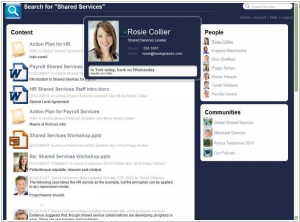Liferay vs OpenText
May 25, 2023 | Author: Michael Stromann
Liferay and OpenText are both enterprise-level content management systems, but they differ in their approaches and features. Liferay is an open-source digital experience platform that offers a wide range of capabilities for content management, collaboration, and personalized user experiences. It provides features such as web content management, document management, social collaboration, and integration with other business systems. Liferay focuses on creating engaging digital experiences and fostering collaboration within organizations. On the other hand, OpenText is a leading provider of enterprise information management solutions that encompass document management, content management, and records management. OpenText excels in enterprise-scale content management, compliance, and governance, offering robust capabilities for information governance, secure document sharing, and collaboration. OpenText is favored by organizations with extensive compliance requirements and a focus on managing large volumes of content and information.
See also: Top 10 ECM software
See also: Top 10 ECM software
Liferay vs OpenText in our news:
2022. OpenText acquires Micro Focus for $6B

ECM giant OpenText is acquiring Micro Focus for a total value of $6 billion. Micro Focus, a British company, has primarily expanded its business by purchasing legacy software companies such as Borland, Novell, and Cobol-IT. One of its most prominent agreements was a $8.8 billion partnership with HPE in 2016, focusing on a part of HPE's enterprise software portfolio, including the well-known Autonomy deal. While OpenText's content management roots do not directly align with most of Micro Focus' offerings, this acquisition seems to be driven by the desire to grow and expand rather than pursuing immediate synergy with the acquiring company.
2017. OpenText acquired forensic security vendor Guidance Software
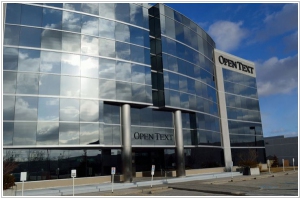
Forensic security and eDiscovery vendor Guidance Software has been acquired by content management company OpenText in a deal worth $240 million. OpenText has demonstrated a willingness to invest in strategic acquisitions to fill gaps in its portfolio, even if it means acquiring companies with overlapping functionality. A notable example is its acquisition of Documentum, an alternative enterprise content management firm, from EMC for $1.62 billion approximately a year ago. While this acquisition may introduce some overlapping functionality, it also grants OpenText access to new forensic tools—a domain previously unexplored by the company. According to Cheryl McKinnon, an analyst at Forrester Research specializing in the content management industry, this move expands OpenText's capabilities and expertise in forensics.
2016. OpenText acquires Documentum for $1.62 billion
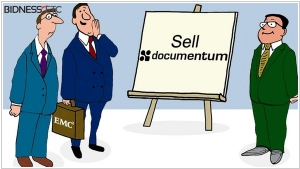
OpenText is set to purchase Dell EMC's enterprise content division, which includes Documentum, for a total of $1.62 billion. As per the agreement, OpenText will integrate the software, associated services, and employees of ECD into its operations. This acquisition comes shortly after Dell's official merger with EMC, where EMC's content management business was deemed incompatible. In 2003, EMC acquired Documentum for $1.7 billion, although it was widely known that EMC had been actively seeking a buyer for Documentum in recent years. With this acquisition, OpenText solidifies its position as a leading provider in Enterprise Information Management and now directly competes with IBM's FileNet.
2016. OpenText acquired Recommind
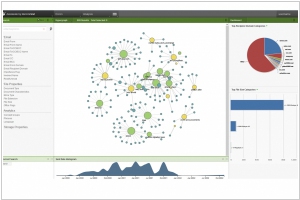
Just one week following the announcement of OpenText raising $600 million through the sale of senior debt notes to support future acquisitions, the company has made a significant investment of $163 million to acquire Recommind, a provider of e-discovery and information analytics solutions. Recommind offers a Software-as-a-Service (SaaS) platform along with managed services, including Axcelerate for e-discovery review and analysis, Perceptiv for contract analytics, and Decisiv for enterprise-wide information access. OpenText officials have expressed that the addition of e-discovery capabilities will complement their existing enterprise information management (EIM) solutions. Furthermore, the acquisition of Recommind will enhance OpenText's proficiency in cloud services and analytics, expanding their overall expertise in these domains.
2016. Liferay launched Digital Experience Platform
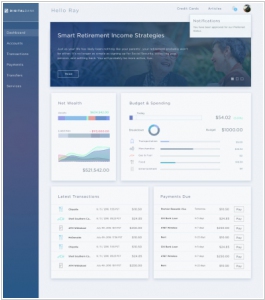
The Open source enterprise CMS provider, Liferay, has introduced its Digital Experience Platform (DXP). This platform is specifically designed to assist companies in creating and managing experiences that facilitate the entire customer relationship. It offers a comprehensive customer view that goes beyond marketing by integrating sales, marketing, support, and service teams. With DXP, companies can develop highly personalized experiences by targeting valuable information, offers, and resources to specific user segments and individuals. It also enables the creation of a unified customer profile that consolidates all interactions and significant data points. Furthermore, DXP provides access to engagement data such as views on video content, click-through rates on targeted materials, community participation, and social metadata.
2016. Liferay launches Digital Experience platform
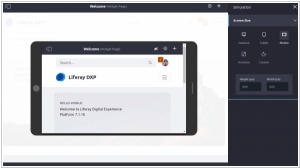
Historically recognized as portal software, Liferay has now ventured into the digital experience market with its latest offering, the DXP (Digital Experience Platform). This strategic shift represents a natural evolution for Liferay rather than a complete departure from its previous trajectory. As stated by Bryan Cheung, the CEO of Liferay, their customers consistently expressed a need for functionalities that went beyond the scope of traditional portal implementations. In response, Liferay would develop or integrate those features, prompting a reevaluation of their position in the market. The Liferay DXP consists of various components, with the portal platform serving as its foundation. The platform includes seamless integrations with numerous backend systems, including CRM, ERP, support, and others. This infrastructure empowers customers to create a wide range of customer experience solutions spanning web experiences, mobile experiences, and even hybrid online/offline experiences throughout the entire customer lifecycle. Please note that while the HTML tags and links were retained, they may not be properly rendered in this plain text format.
2015. Liferay partners with Red Hat to provide an open source portal solution
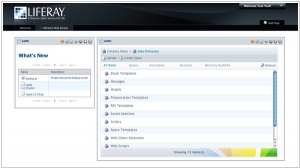
Liferay and Red Hat have joined forces to collaborate on an open-source portal that combines the capabilities of Liferay Portal and Red Hat JBoss Enterprise Application Platform (JBoss EAP). This product specifically targets companies seeking open-source options with enterprise-grade portal solutions. The collaboration also hints at the possibility of integrating with other Red Hat JBoss Middleware products in the future. From a business standpoint, this partnership is intriguing as Red Hat ceased offering new subscriptions to JBoss Portal in February 2015. However, Red Hat will continue to provide support for JBoss Portal until the scheduled end of the current release stream in March 2018. This new venture exemplifies Red Hat's ongoing commitment to the portal market, showcasing their dedication to serving customers in this domain.
2014. OpenText buys Big Data analytics provider Actuate for $330 Million
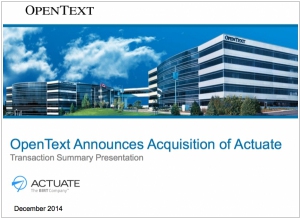
The global leader in Enterprise Content Management, OpenText, has completed the acquisition of Actuate, a prominent provider of Business Intelligence solutions. Actuate, renowned as "the BIRT company," specializes in Enterprise Business Intelligence and is closely associated with BIRT, which stands for "Business Intelligence Reporting Tools" and is an open-source project under the Eclipse Foundation. Actuate actively supports BIRT by offering the open-source IDE, while also developing BIRT iHub, a deployment platform that greatly enhances developer productivity when working on customer-facing applications. Additionally, Actuate's BIRT Analytics empowers users with self-service predictive analytics capabilities to improve customer engagement utilizing Big Data. Moreover, Actuate for CCM provides ECM architects with a seamless solution to transform, process, personalize, and archive high-volume content with ease.
2012. Open Text and Liferay create Dropbox clones
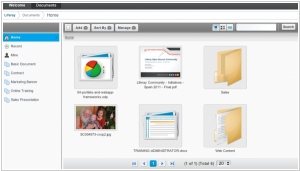
Could you have imagined just a few years ago that esteemed enterprise vendors like Open Text and Liferay, known for developing sophisticated enterprise content management systems (ECM), would emulate a seemingly straightforward consumer service like Dropbox? Surprisingly, it has become a reality. Even within large corporations that heavily rely on ECM, employees are ordinary individuals who desire a seamless working experience. They too seek systems that facilitate their work instead of hindering it, and many of them resort to using Dropbox despite IT administrators prohibiting its usage. As a result, a single solution emerges: to create a similar user-friendly service that abides by the corporate firewall. This very concept underlies the introduction of the new services: Open Text Tempo and Liferay Sync. These services enable file synchronization between desktop folders, web accounts, tablets, and smartphones, facilitating quick file sharing among colleagues while ensuring the files are stored securely on corporate servers. It's that simple.
2009. Open Text launches social interface
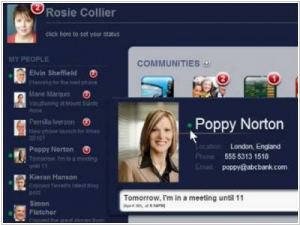
Open Text has recently introduced a new module for its ECM platform called Open Text Social Workplace, designed to assist organizations in implementing social tools. The company recognizes that traditional collaboration tools are no longer sufficient for intranet collaboration. Users now demand more user-friendly social tools and are willing to utilize them, even without IT compliance. However, it is crucial for companies that deploy these social tools to address potential security concerns. The new Open Text social interface offers an extensive array of collaboration tools, including communities, profiles, blogs, wikis, personal home pages, and mobile access (available for iPhone and BlackBerry). Furthermore, these features are accompanied by compliance management, similar to that used for managing enterprise email.


